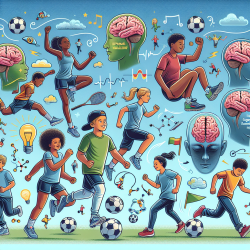The COVID-19 pandemic has profoundly impacted every aspect of life, particularly for children and youth (CY). The research article "What the children tell us: the COVID-19 pandemic and how the world should respond" underscores the importance of integrating children's voices into response strategies. As practitioners, we have a unique opportunity to learn from these insights and improve our approaches to support children better.
Understanding Children's Perspectives
The research highlights that children have been significantly affected by the pandemic's indirect consequences. These include disruptions in education, health services, and social interactions. Yet, despite these challenges, children's perspectives were often overlooked in planning and implementing pandemic responses.
Children articulated their needs clearly, emphasizing the necessity for accurate information tailored to them and recognition as stakeholders in response planning. They expressed concerns about health risks to themselves and their families, educational disruptions, and increased reliance on technology.
Key Recommendations from Children
- Accurate Information: Children need information presented in a way they can understand. This includes updates on health guidelines and pandemic-related changes.
- Inclusion as Stakeholders: Children want to be involved in decision-making processes that affect their lives. This inclusion can lead to more effective and resilient strategies.
- Access to Resources: Ensuring access to essential resources such as food, water, and healthcare is crucial. Children in low-income areas highlighted these needs as critical during the pandemic.
- Mental Health Support: Access to mental health services is vital, especially for adolescents who faced increased stress and anxiety during lockdowns.
- Educational Equity: The shift to online learning highlighted disparities in access to technology. Children recommended alternative learning methods like radio or TV broadcasts to reach those without internet access.
Implications for Practitioners
Practitioners working with children can take several steps to integrate these insights into their work:
- Advocate for Children's Voices: Encourage policies that include children in decision-making processes at local, national, and international levels.
- Enhance Communication: Develop communication strategies that provide clear and age-appropriate information about health and safety measures.
- Support Mental Health Initiatives: Collaborate with schools and communities to provide accessible mental health resources tailored for young people.
- Promote Educational Access: Work with educational institutions to ensure all children have access to learning materials, regardless of their socio-economic status.
- Create Safe Spaces: Ensure that children have safe environments for play and social interaction, recognizing these as vital for mental well-being.
The Path Forward
The findings from this research call for a paradigm shift in how we engage with children during crises. By recognizing them as active participants rather than passive recipients of aid, we can develop more effective responses that address their unique needs.
The COVID-19 pandemic has taught us valuable lessons about resilience and adaptability. As practitioners, we must continue to advocate for children's rights and ensure their voices are heard in shaping policies that affect their futures.
This research provides a foundation for further exploration into how practitioners can implement these recommendations effectively. By doing so, we can build systems that not only respond to immediate crises but also foster long-term well-being for children worldwide.
To read the original research paper, please follow this link: What the children tell us: the COVID-19 pandemic and how the world should respond.










